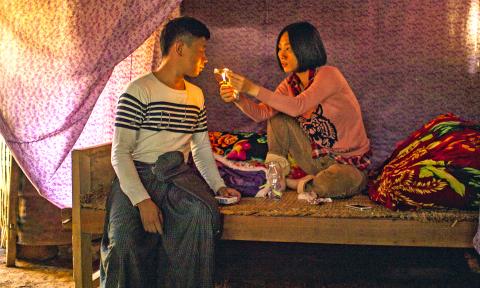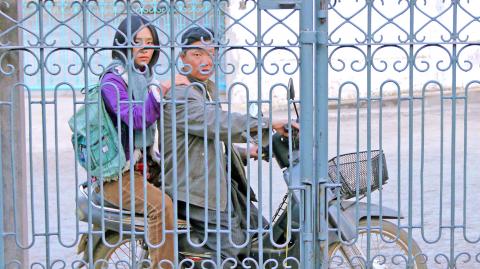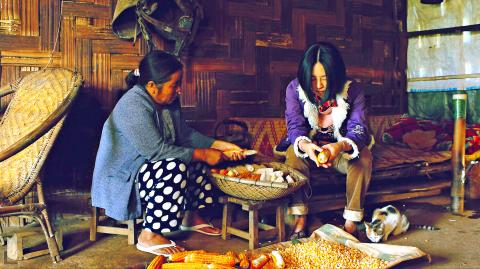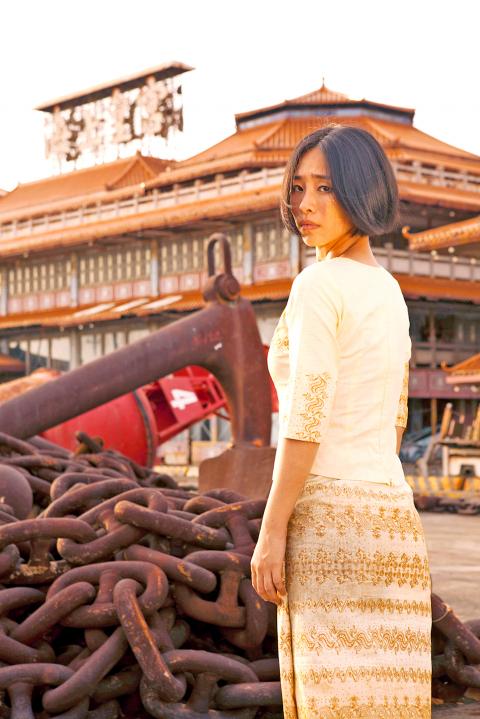Myanmar-born, Taiwan-based director Midi Z (趙德胤) continues his examination of social and economic hardships in contemporary Myanmar with Ice Poison (冰毒), a tender portrait of displaced individuals trapped in perpetual poverty. The tale of how two young Burmese who get caught up in the illicit drug trade in order to escape their grim circumstances is emotionally engaging, while maintaining a deliberate pace and sober distance.
“Everything is getting more expensive except for our crops,” remarks an old farmer at the start of the film. The statement symbolizes the destitution faced by the inhabitants of an impoverished ethnic Chinese village located outside the town of Lashio, Myanmar. A typical Midi Z narration sets in and, with a still, observational camera, centers on the farmer and his son (Wang Shin-hong, 王興洪) as they discuss their options to make ends meet. Ruling out his sons’ suggestion to work in a jade mine, where drug abuse spreads like an epidemic among workers, the father decides to ask relatives and friends for a loan so that the son can buy a scooter and make a living as a motorcycle taxi driver.
Harsh government regulations and the grim realities of unemployment and poverty are subtly revealed through meandering conversations held by the father and son with their equally poor neighbors. Eventually, the two strike a deal with a comparatively well-off relative, who takes the father’s cow as down payment for an old motorbike. If payments are not made on time, the animal will be sent to the slaughterhouse.

Photo Courtesy of Flash Forward Entertainment
Unfortunately, the new business venture fails. From a distance, Midi Z’s long, static shots give the audience ample space and time to follow and empathize with the son’s vain attempts to score a fare amid faceless drivers and passengers at Lashio’s bus station.
He then meets his first passenger, Sanmei (Wu Ke-xi, 吳可熙), a Chinese-Burmese woman who was tricked into marrying a much older man in Yunnan, China. Back in Lashio for her grandfather’s funeral, Sanmei plans to leave her loveless marriage and is determined to take back her child from her Chinese husband and make enough money so that she can return to Myanmar.
The second part of the film makes a shift toward a more emotional tone as friendship develops between the driver and Sanmei, and it comes as no surprise that, having found a way to make quick cash by helping her drug-dealing cousin transport methamphetamines — euphemistically known as “ice poison” to locals — Sanmei convinces the driver to go into the drug trade with her as a courier.

Photo Courtesy of Flash Forward Entertainment
For a short while, the money they get from the sale of crystal meth and a growing romance between the two offers brief respite from their harsh reality.
Shot on location by a seven-member crew, Ice Poison is Midi Z’s biggest production to date, and its narrative structure the most measured. As in his feature debut Return to Burma (歸來的人, 2011) and, later, Poor Folk (窮人。榴槤。麻藥。偷渡客, 2012), the director turns his low-key, dispassionate lens on ordinary Burmese, delivering a sober portrait of contemporary life in rural Myanmar, where the sale of narcotics is never a moral flaw, but a matter of survival. The sense of despair and resignation rooted in the impoverished life is poignantly conveyed through the naturalistic performances by Wang and Wu, Midi Z’s ongoing collaborators.
Dramatic tension is built up between the two characters over the course of the movie. A sense of mobility and freedom is acutely felt as the camera follows the driver and Sanmei riding their bike, high on meth, along rural dirt roads — an emotional and physical rush that, in the end, proves short-lived.

Photo Courtesy of Flash Forward Entertainment
In a coda to Midi Z’s portrait of the grim realities of contemporary Myanmar, the farmer’s cow is slaughtered, as if heralding the bleak future of its human counterparts, the underprivileged and the impoverished, destined to be left behind as the country opens itself up to the forces of global capital.
A more experimental side of Midi Z’s cinema can be seen in The Palace on the Sea (海上皇宮), a 15-minute short film the director made last year with funding provided by the Kaohsiung Film Archive (高雄市電影館). Revolving around a woman and a man, played by Wu and Wang respectively, who keep meeting each other on a moored ship, the film serves as a poetic counterpart to the director’s realistic feature films, beautifully weaving together the motifs of diaspora and displacement.
Ice Poison and The Palace on the Sea are playing at Spot — Huashan Cinema (光點華山電影館), 1, Bade Rd Sec 1, Taipei City (台北市八德路一段1號) until Aug. 7.

Photo Courtesy of Flash Forward Entertainment

One of the biggest sore spots in Taiwan’s historical friendship with the US came in 1979 when US president Jimmy Carter broke off formal diplomatic relations with Taiwan’s Republic of China (ROC) government so that the US could establish relations with the People’s Republic of China (PRC). Taiwan’s derecognition came purely at China’s insistence, and the US took the deal. Retired American diplomat John Tkacik, who for almost decade surrounding that schism, from 1974 to 1982, worked in embassies in Taipei and Beijing and at the Taiwan Desk in Washington DC, recently argued in the Taipei Times that “President Carter’s derecognition

This year will go down in the history books. Taiwan faces enormous turmoil and uncertainty in the coming months. Which political parties are in a good position to handle big changes? All of the main parties are beset with challenges. Taking stock, this column examined the Taiwan People’s Party (TPP) (“Huang Kuo-chang’s choking the life out of the TPP,” May 28, page 12), the Democratic Progressive Party (DPP) (“Challenges amid choppy waters for the DPP,” June 14, page 12) and the Chinese Nationalist Party (KMT) (“KMT struggles to seize opportunities as ‘interesting times’ loom,” June 20, page 11). Times like these can

June 23 to June 29 After capturing the walled city of Hsinchu on June 22, 1895, the Japanese hoped to quickly push south and seize control of Taiwan’s entire west coast — but their advance was stalled for more than a month. Not only did local Hakka fighters continue to cause them headaches, resistance forces even attempted to retake the city three times. “We had planned to occupy Anping (Tainan) and Takao (Kaohsiung) as soon as possible, but ever since we took Hsinchu, nearby bandits proclaiming to be ‘righteous people’ (義民) have been destroying train tracks and electrical cables, and gathering in villages

Dr. Y. Tony Yang, Associate Dean of Health Policy and Population Science at George Washington University, argued last week in a piece for the Taipei Times about former president Ma Ying-jeou (馬英九) leading a student delegation to the People’s Republic of China (PRC) that, “The real question is not whether Ma’s visit helps or hurts Taiwan — it is why Taiwan lacks a sophisticated, multi-track approach to one of the most complex geopolitical relationships in the world” (“Ma’s Visit, DPP’s Blind Spot,” June 18, page 8). Yang contends that the Democratic Progressive Party (DPP) has a blind spot: “By treating any